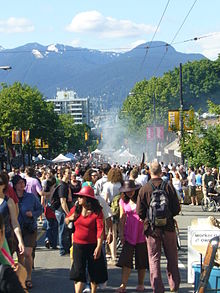
Granville Island is a peninsula and shopping district in the Fairview neighbourhood of Vancouver, British Columbia, Canada, across False Creek from Downtown Vancouver, under the south end of the Granville Street Bridge. Formerly an industrial manufacturing area, it was named after Granville Leveson-Gower, 2nd Earl Granville.

Greektown in Vancouver, British Columbia, Canada is an area in the Kitsilano neighborhood that was historically an enclave of Greek immigrants and their descendants. The term is an informal one, and Greektown's borders are not strictly defined; however, West Broadway around Trutch Street is generally considered the neighbourhood's heart, while Blenheim St to the west and MacDonald St to the east are approximately its outer limits. Vancouverites of Greek descent, who live in Kitsilano, nostalgically also call the area Ουέστ Μπροντουέι.

Kitsilano is a neighbourhood located in the city of Vancouver, British Columbia, Canada. Kitsilano is named after Squamish chief August Jack Khatsahlano, and the neighbourhood is located in Vancouver's West Side along the south shore of English Bay, between the neighbourhoods of West Point Grey and Fairview. The area is mostly residential with two main commercial areas, West 4th Avenue and West Broadway, known for their retail stores, restaurants and organic food markets.
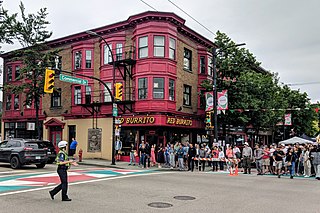
Commercial Drive is a roadway in the city of Vancouver in British Columbia, Canada, that extends from Powell Street at its northern extremity, near the waterfront, south through the heart of the Grandview–Woodland neighbourhood to the Victoria Diversion near Trout Lake. The neighbourhood is so dominated by the businesses, cultural facilities, and residents along Commercial Drive that the area is far better known as "The Drive" than by the civic boundaries. The district is one of Vancouver's Business Improvement Areas (BIA).

False Creek is a short narrow inlet in the heart of Vancouver, separating the Downtown and West End neighbourhoods from the rest of the city. It is one of the four main bodies of water bordering Vancouver, along with English Bay, Burrard Inlet, and the Fraser River. Granville Island is located within the inlet.
The Punjabi Market, also known as Little India, is a commercial district and ethnic enclave in Vancouver, British Columbia. Officially recognized by the city as being primarily a major South Asian, Indo-Canadian and Punjabi population business community and cultural area, the Punjabi District is roughly a six block section of Main Street around 49th Avenue in the Sunset neighbourhood.

Ciclovía, also ciclovia or cyclovia, is a Spanish term that means "cycleway", either a permanent bike path or the temporary closing of certain streets to automobiles for cyclists and pedestrians, a practice sometimes called open streets.

The Vancouver Police Department (VPD) is the police force in Vancouver, British Columbia, Canada. It is one of several police departments within the Metro Vancouver Area and is the second largest police force in the province after RCMP "E" Division.

East Vancouver is a region within the city of Vancouver, British Columbia, Canada. Geographically, East Vancouver is bordered to the north by Burrard Inlet, to the south by the Fraser River, and to the east by the city of Burnaby. East Vancouver is divided from Vancouver's "West Side" by Ontario Street.
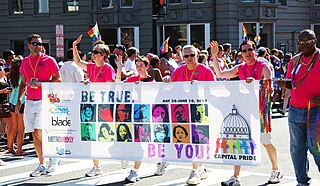
Capital Pride is an annual LGBT pride festival held in early June each year in Washington, D.C. It was founded as Gay Pride Day, a one-day block party and street festival, in 1975. In 1980 the P Street Festival Committee formed to take over planning. It changed its name to Gay and Lesbian Pride Day in 1981. In 1991, the event moved to the week prior to Father's Day. Financial difficulties led a new organization, One In Ten, to take over planning of the festival. Whitman-Walker Clinic (WWC) joined One In Ten as co-sponsor of the event in 1997, at which time the event's name was changed to Capital Pride. Whitman-Walker became the sole sponsor in 2000. But the healthcare organization came under significant financial pressures, and in 2008 turned over producing duties to a new organization, Capital Pride Alliance.
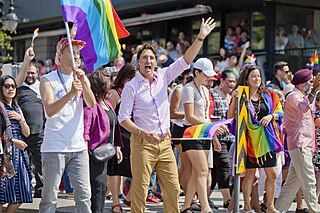
The Vancouver Pride Parade and Festival is an annual LGBT Pride event, held each year in Vancouver, British Columbia, to celebrate lesbian, gay, bisexual, and transgender people and their allies. It is run by the Vancouver Pride Society (VPS), a not-for-profit, volunteer-run organization that seeks to "produce inclusive, celebratory events, and advocacy for LGBTQAI2S+". Vancouver's Pride Parade is the largest parade of any kind in Western Canada.

Broadway is a major east–west thoroughfare in the city of Vancouver, British Columbia, Canada. In Vancouver's numbered avenue grid system, it runs in place of a 9th Avenue, between 8th and 10th. The street has six lanes for most of its course. Portions of the street carry the British Columbia Highway 7 designation.
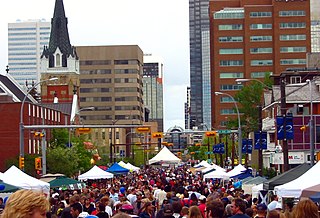
Lilac festival is an annual street festival held in Calgary, Alberta, Canada. The festival has grown to entertain over 100,000 people each spring. The lilac (Syringa) flowers are often blooming throughout the area at this time.
Qualicum-Graham Park or Qualicum is a suburban neighbourhood in College Ward in the City of Ottawa, Ontario, Canada. It is located in the former City of Nepean in the west end of the city. Many of the residences in the area are executive homes situated on large lots (100x100) being built in the 1960s. Qualicum Street boasts large custom houses built by Bill Teron. The neighbourhood is bounded to the north by the Queensway, to the west by Richmond Road, to the south by Baseline Road, and to the east by Morrison Drive at the former Ottawa-Nepean border towards Redwood. Named after Qualicum Beach in British Columbia.

The Eden Mills Writers' Festival is held annually in the village of Eden Mills, which is approximately 12 kilometres (7.5 mi) east of Guelph, Ontario, Canada. The festival includes readings by poets, authors, and other writers at various outdoor venues throughout the village. The festival occurs on the second Sunday after Labour Day in September. In previous years more than 40 Canadian authors appeared to give readings and interact with audiences, including notable Canadian writers such as Margaret Atwood and P. K. Page. On September 15, 2013, the Festival celebrated its 25th anniversary.
"Paul Wong is a Canadian multimedia artist. An artist, curator, and organizer of public interventions since the mid-1970s, Wong is known for his engagement with issues of race, sex, and death. His work varies from conceptual performances to narratives, meshing video, photography, installation, and performance with Chinese-Canadian cultural perspectives".

Pride Winnipeg Festival is a 10-day LGBT pride festival, held annually in Winnipeg, Manitoba, Canada. It is one of the largest organized pride festivals in central Canada, featuring 10-days of community-organized events, a Dyke March, a rally, Pride Parade, outdoor festival and closing party.
The Vancouver Greenway Network is a collection of greenways across Vancouver, British Columbia, Canada. Greenways are streets where pedestrians and cyclists are prioritized over motorized vehicles, through structures such as road closures and road diverters to prevent or limit motor vehicle traffic, widened sidewalk-promenades, narrowed road space, speed restrictions, bike lanes, raised sidewalks and speed bumps. The City of Vancouver hopes to create and maintain the trend of constructing new greenways to establish a network where, potentially, every citizen could access a city greenway within a 25-minute walking or a 10-minute cycling distance of their home.

Ciclovia in the United States are scheduled open-streets car-free festivals in various American cities. The ciclovia concept originated in Bogotá, Colombia.
